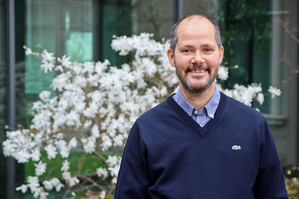Dr. Martin Ramstedt
Max Planck Institute for Social Anthropology, Halle
Curriculum Vitae
Martin Ramstedt studied cultural anthropology, social psychology, European ethnology, prehistory and Indian studies at Ludwig Maximilians University in Munich, Germany. In 1997, he obtained his doctorate. His dissertation was titled, “Worldview, Soteriology, and Legitimacy of Rule in Pre-colonial Bali. An Analysis of the Court Discourse”. From 1997 until 2000, he was European Science Foundation research fellow at the International Institute for Asian Studies in Leiden, the Netherlands, and at the same time associated fellow at the Nordic Institute for Asian Studies in Copenhagen, Denmark. He continued working as senior research fellow at the IIAS from 2000 until 2001. From 2001 until 2006, he was researcher at the Meertens Institute, a Royal Netherlands Academy of Science institute in Amsterdam.
Dr. Ramstedt has taught anthropology of law and anthropology of religion at different Dutch universities, at the International Institute for the Sociology of Law in Oñati, Spain, at the School of Oriental and African Studies in London, and at the universities of Münster and Halle in Germany.
From October 2006 until February 2012, he was senior researcher in the Project Group ‘Legal Pluralism’ at the Max Planck Institute (MPI) for Social Anthropology in Halle, Germany, which was headed by Franz and Keebet von Benda-Beckmann. His research then focused on the decentralization process in Indonesia, which was marked by increasing accommodation of religion and ethnic customary law in Indonesian state law. Since March 2012, he is senior researcher at the newly founded Law & Anthropology Department at the MPI for Social Anthropology in Halle, which is directed by Marie-Claire Foblets. His responsibilities at the department mainly focus on the development of the research area ‘Law and Religion’.
From March 2014 to February 2015, Dr. Martin Ramstedt was fellow at the Käte Hamburger Center for Advanced Studies in the Humanities “Law as Culture”.
Research Project
Indigeneity and Conflict in Bali: On the Cultural Translation of International Legal Norms
How do we solve legal conflicts in a globalized world with its entangled, multi-layered, both globalized and fragmented legal systems? In order to be able to do so we need an adequate knowledge of the contextually embedded and historically contingent hybridization processes that bring about “plural law” (Sabine Müller-Mall).
The travel, transplantation and integration of alien or international legal norms are important factors for the hybridization of law, which can be conceptualized as problems of cultural translation. The paradigm of cultural translation, which has developed out of the so-called “cultural turn” in the social sciences, addresses issues that arise in connection with the transposition of ideas, norms, values, practices and institutions from one cultural environment into another. It departs from the assumption of cultural relativism that cultures are fundamentally not translatable. Processes of cultural translation hence always entail negotiation, semantic shifts and transformation. In order not to deteriorate to a mere metaphor, the concept of cultural translation needs to be developed into a methodologically robust analytical tool (Doris Bachmann-Medick). My project is partly dedicated to this goal.
Here, I specifically deal with issues involved in the cultural translation of the rights of indigenous peoples. My case study centers on respective legal developments in Bali against the backdrop of the recent process of decentralization in Indonesia. My research shows that the translation of indigenous rights into different Balinese frames of reference have spurred two kinds of conflicts. Augmenting the extant legal pluralism in Indonesia, it first of all exacerbated interlegal tensions within the Indonesian legal system. Secondly, it prompted significant semantic shifts in the local politics of identity as well as a transformation of central local institutions on the basis of these semantic shifts. This again has magnified and increased inner-Balinese disputes and tensions.
Selected Publications
- Journal of Legal Pluralism, Special Issue: Temporalities of Law (co-edited with Keebet von Benda-Beckmann and Melanie Wiber), London; New York: Routledge (scheduled to appear in March 2014).
- Religion in Disputes: Pervasiveness of Religious Normativity in Disputing Processes (co-edited with Franz von Benda-Beckmann, Keebet von Benda-Beckmann and Bertram Turner), New York: Palgrave Macmillan 2013.
- Asian Ethnicity 13/4, Special Issue: Law and Religio-Ethnic Identity in Post-New Order Indonesia (co-edited with Fadjar I. Thufail), London; New York: Routledge 2012.
- ASIEN No. 123: Ethnizität und Religion als Kapital: Prozesse der Kapitalisierung von Kultur im Indonesien nach Suharto (co-edited with Martin Slama and Christian Warta), Hamburg: German Association for Asian Studies 2012.
- Kegalauan Identitas: Agama, Etnisitas, dan Kewarganegaraan Pada Masa Pasca-Orde Baru (co-edited with Fadjar I. Thufail), Jakarta: Grasindo 2011.
- Colonial Encounters between India and Indonesia, in: South Asian History and Culture 2(4), pp. 522-539, 2011.
- Decentralization and Regional Autonomy in Indonesia: Implementation and Challenges (co-edited with Coen J.G. Holtzappel), Singapore: ISEAS 2009.
- Hindu Bonds at Work: Spiritual and Commercial Ties between India and Bali, in: The Journal of Asian Studies 67(4), pp. 1227-1250, 2008.
- Anthropology and the Nation State: Applied Anthropology in Indonesia, in: J. van Bremen, E. Ben-Ari and S. Farid Alatas (eds.): Asian Anthropology. London; New York: Routledge 2005, pp. 201-223.
- Hinduism in Modern Indonesia – A minority religion between local, national, and global interests, London et al.: RoutledgeCurzon 2004 (Paperback Edition 2006; Kindle Edition 2007).
- Weltbild, Heilspragmatik und Herrschaftslegitimation im vorkolonialen Bali. Eine Analyse des höfischen Diskurses, Frankfurt a. M. et al.: Peter Lang, Europäischer Verlag der Wissenschaften 1998.


